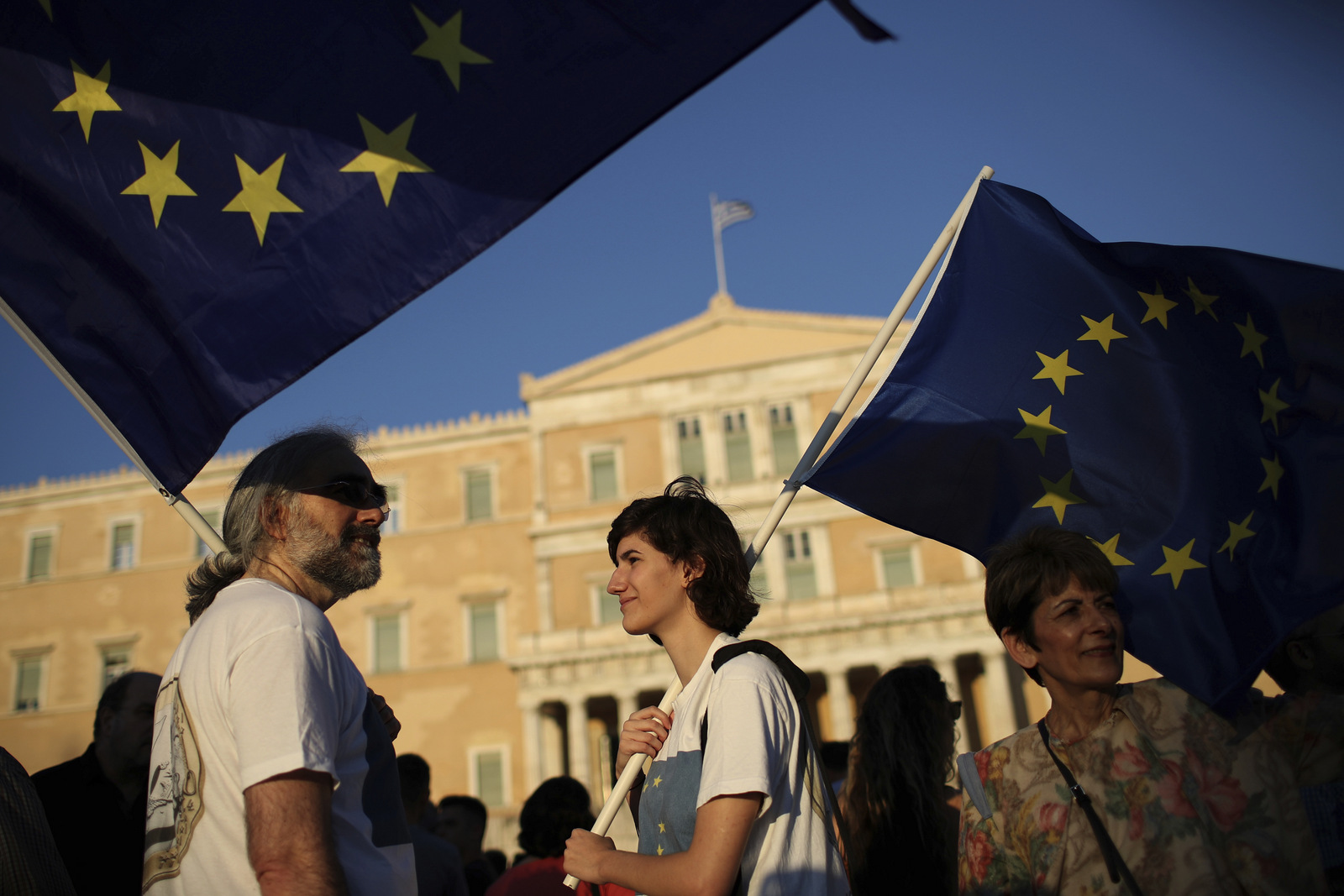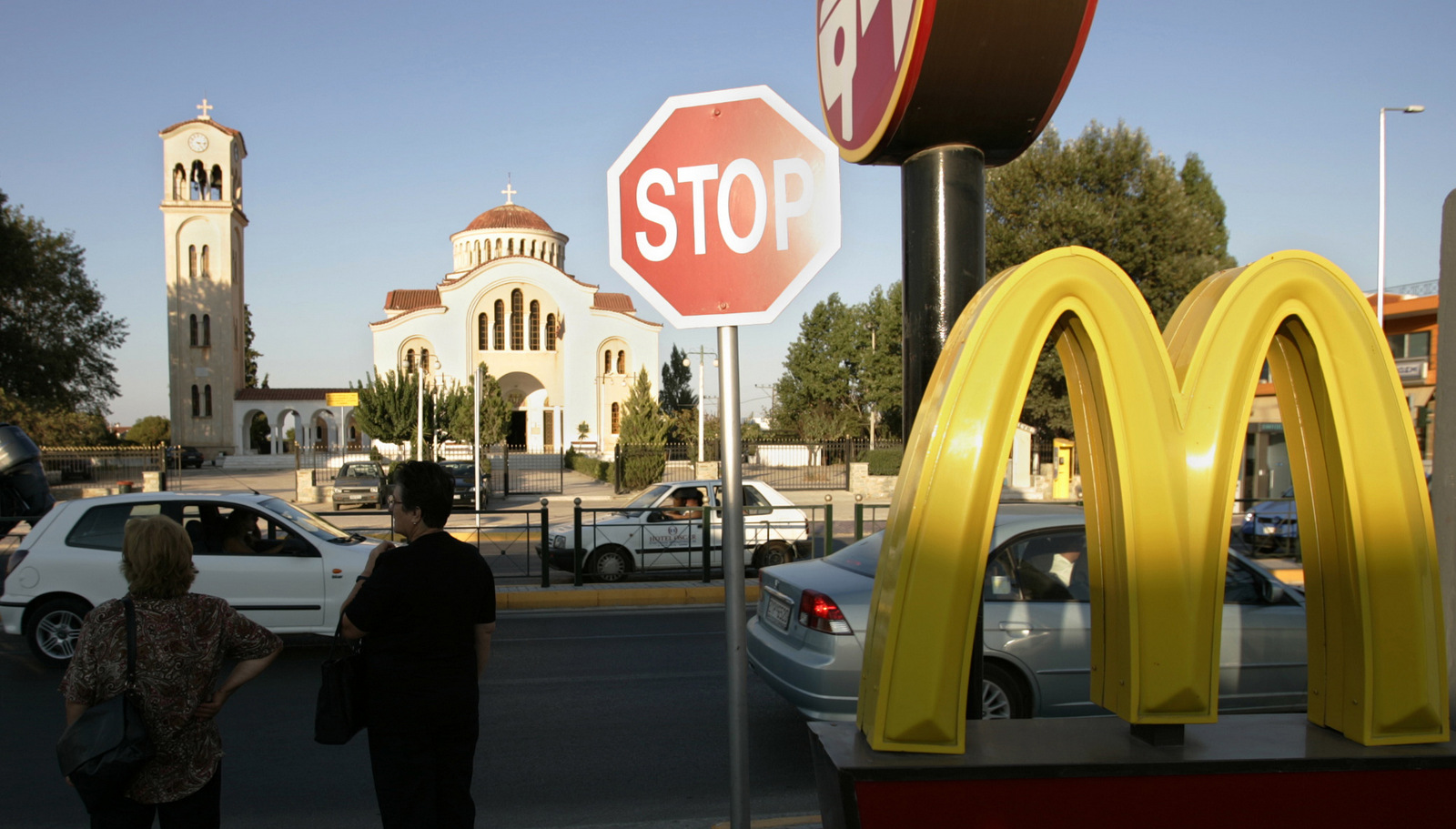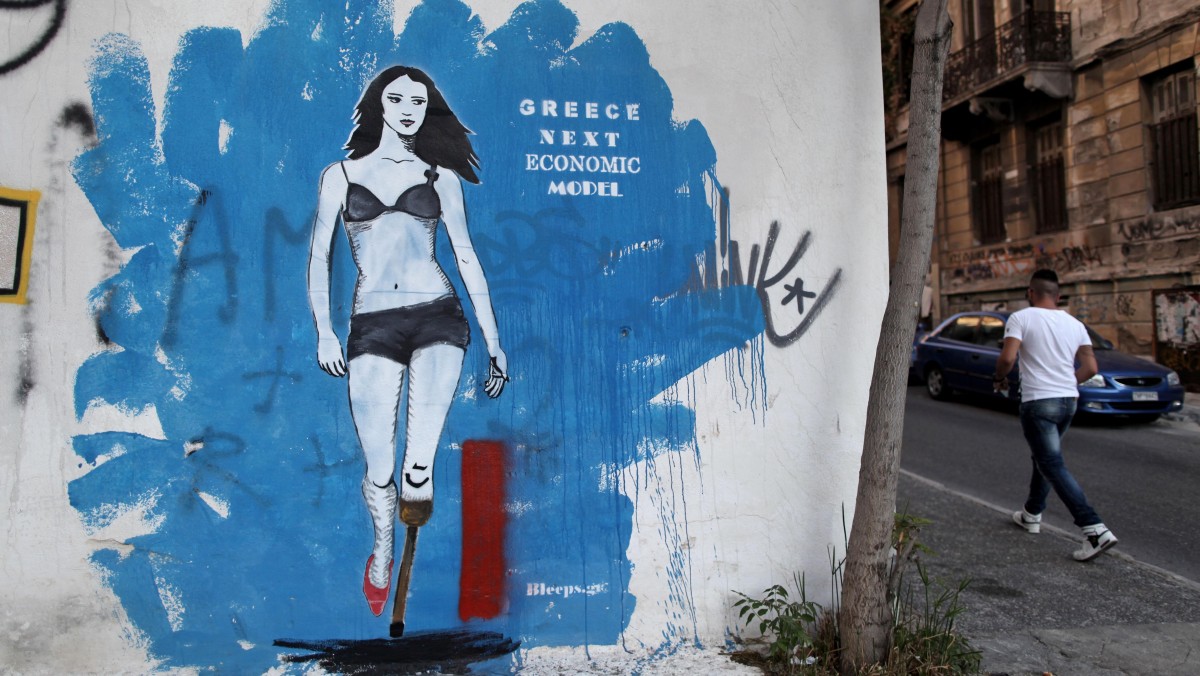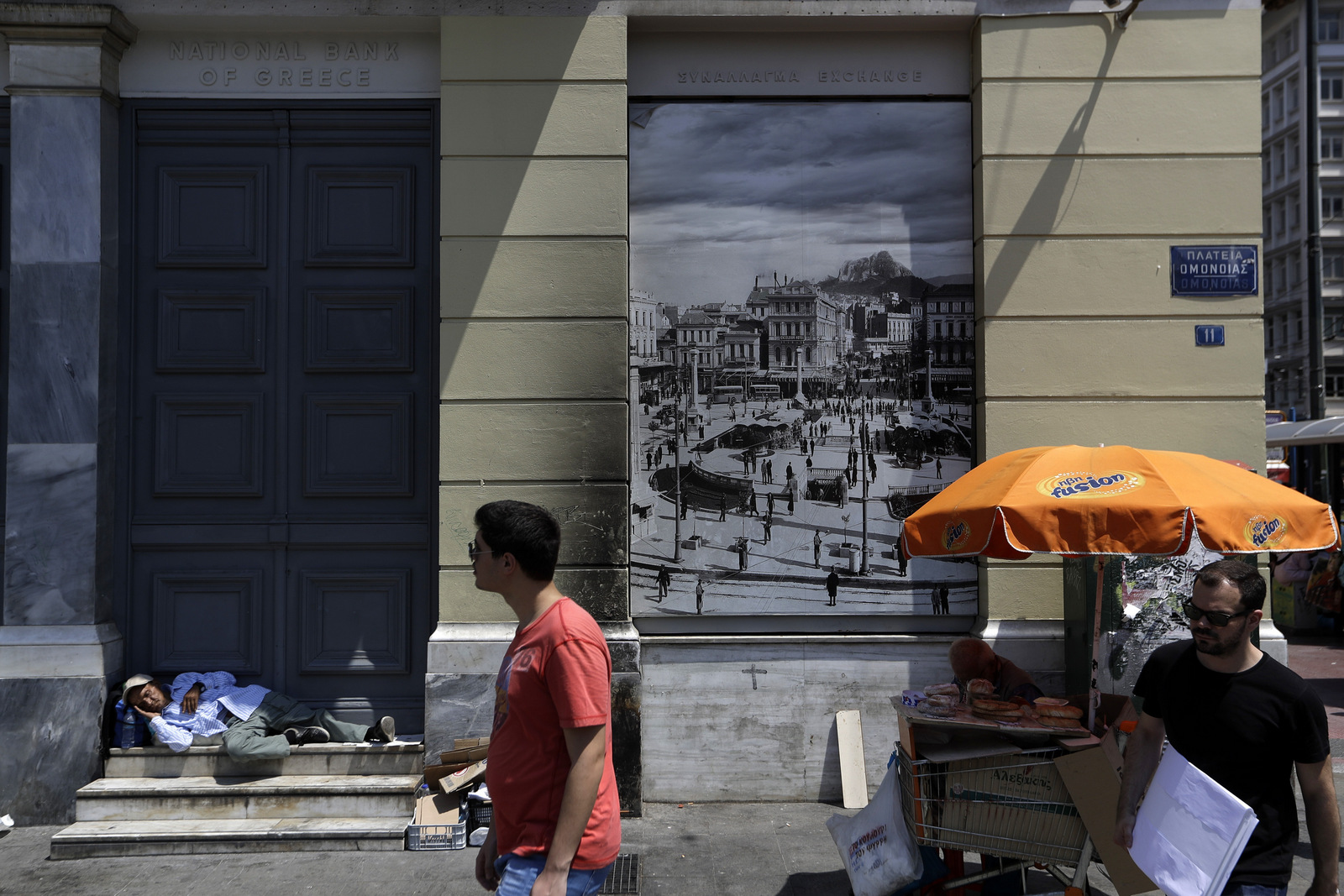SOURCE: MINTPRESSNEWS
“Let’s face the problem of our colonial status. Let’s work to find a solution for it. Let’s decolonize our minds and spirits and become real citizens of Puerto Rico.”
Rivera’s words were, of course, made in reference to Puerto Rico. However, it can be said that they are also applicable to many other nations, including nominally independent states such as Greece, a country which has been ravaged by almost a decade of stifling economic austerity imposed by the European Union and the International Monetary Fund (IMF); a country which could be described as a modern-day debt colony.
Having been raised in the United States as a “third culture kid,” with one foot in the U.S. and one foot in Greece, allows me to see things in both societies simultaneously as a native and as a relative outsider. This has particularly been true during the past four-plus years, a period in which I have resided almost full-time in Athens as a doctoral student and journalist.
Modern-day Greece: Fatalism, defeatism and hopelessness
The extent of the demoralization of the Greek people is plainly evident through everyday conversations and encounters. Ordinary Greeks, upon learning that I came to the country to perform academic research, react in surprise and confusion, wondering why anyone would be crazy enough to come to Greece to stay for an extended period. Years ago, soon after the onset of the crisis, two different taxi drivers, upon realizing that I was from overseas, questioned why I chose to come to Greece. “Why are you here? Don’t you see what is happening?” I was asked. “Leave now, as quickly as you can!”

Farmers stand behind a makeshift fire in front of tractors, near Kerdilia, Greece. (AP/Giannis Papanikos)
Another driver interrogated me about job conditions in the United States, clearly because he had emigration on his mind. When I would mention that I was in Greece to perform academic research, but more importantly, because it was my homeland, people looked at me, quite simply, as if I were crazy.
On other occasions, upon learning that I am an autodidact in the Greek language, Greeks openly wondered why I chose to learn such an “insignificant” language as Greek, instead of a language which offered “potential,” such as German.
I could not escape this pessimism, even back in the United States in faraway Texas. At a farewell party for two Greek-American students who were graduating from my university, one of the students expressed interest in teaching English in Greece and living there for six months or a year. A student from Greece who was part of the conversation, however, warned her against such folly. “Don’t do it, you won’t like it,” he exclaimed. “Greece is only good for summer vacations.”
As far back as the “good old days” of the 1990s, when as a child I was privileged enough to travel to Greece with my family during the summer, I often used to hear mutterings about how much better things would be if Germans ruled Greece instead of the Greeks. Today, eight years into the worst economic crisis a developed country has endured in modern history and at a time when Greece is essentially governed by Brussels and Berlin, one still hears such sentiments expressed with alarming frequency.
Interviews, both academic and journalistic, that I have conducted dating back several years have revealed an overriding sentiment of hopelessness, a belief that the economic crisis that had befallen the country would not be overcome for many, many years. And while the crisis has indeed dragged on, one wonders to what extent such sentiments are self-fulfilling, as a result of the inertia and paralysis which result from the belief that nothing can or will change.
Mental colonization
In a 2013 interview which originally aired on Dialogos Radio, John Perkins, author of the bestselling book “Confessions of an Economic Hitman,” described how “economic hitmen” from institutions such as the IMF and the World Bank, as well as from the private sector, combine their economic takeover of an indebted nation, such as Greece, with a process of mental colonization:
“…[T]hat’s part of the game: convince people that they’re wrong, that they’re inferior. The corporatocracy is incredibly good at that… It’s a policy of them versus us: We are good. We are right. We do everything right. You’re wrong. And in this case, all of this energy has been directed at the Greek people to say ‘you’re lazy; you didn’t do the right thing; you didn’t follow the right policies.”
An observer will quickly determine that Perkins’ words ring true in the case of Greece. Complaining, which was practically a national pastime in the pre-crisis years, has reached stratospheric proportions. A general sense of collective guilt permeates Greek society, and it is common to hear discussions and statements about how “we elected these leaders, we were corrupt, we weren’t good citizens, therefore we deserve our current predicament and everything that is being done to us.” If you note a fatalistic undertone in these utterances, you’re not alone.
This collective guilt has been strongly encouraged by Greece’s political class, who ironically are responsible to a significant degree for Greece’s present-day crisis. Former longtime government minister Theodoros Pangalos, infamous for his salty mouth and previously described by best-selling author Greg Palast as a “fat bastard,” cynically stated at the onset of the crisis that “we ate it all together,” insinuating that Greek citizens benefited collectively from the corruption, nepotism, and cronyism that previous governments (including his own) habitually engaged in.
Following from this collective guilt is a new trend in Greece in which people insist on engaging in what they believe to be the sort of “self-criticism” practiced in other “civilized” countries. In reality, as will be demonstrated, it is sentiments of self-loathing and inferiority which are expressed instead of frank and constructive criticism of the nation’s ills. In turn, these sentiments foster feelings of apathy, hopelessness and paralysis on a national scale, acting as obstacles to any positive transformation.
Greece: The worst in everything?
Contributing to the general sense of helplessness and hopelessness is a commonly-held view that Greece and Greek society are inferior to the “civilized” – as they are often called – countries of the West. This inferiority complex deeply pervades the Greek psyche and every aspect of present-day Greek society.

Greek Protesters hold European flags during an anti government rally outside the Greek parliament, central Athens, June 20 , 2017. (AP/Petros Giannakouris)
Such a mentality has long been present in Greece. Successive waves of immigration out of Greece throughout the 20th century and into the 1970s resulted in a mentality which still lingers, that the “grass is always greener” overseas. With the onset of the economic crisis in 2008-2009, a new wave of emigration out of Greece commenced and approximately 600,000 individuals left Greece during this period. This new wave of emigration has resulted in the re-emergence of these old mentalities.
Old attitudes die hard, and in hearing many Greeks describe their country, one detects an overriding attitude, a prevailing sentiment that views Greece as a “banana republic” and “uncivilized” and that everything is better overseas in the aforementioned “civilized” countries of Northern Europe and the West. There is indeed a Greek word for this mentality: “xenomania,” literally meaning a fascination with anything foreign. Xenomania is rampant in Greece: ranging from the use of “Greeklish” instead of the Greek language, to the all-encompassing preference for seemingly anything foreign, from food to music to fashion.
A common refrain that is heard in Greece whenever anything negative occurs in the country, no matter how minor or inconsequential, is that such things occur “only in Greece.” These assertions often reach epically absurd proportions.
In February, a horrific car accident on one of Greece’s national highways resulted in the death of four people, including a pregnant woman and her three-year-old child who were sitting in an automobile parked at a rest stop. Immediately, a chorus of comments was heard throughout the traditional and social media about how terrible Greece is in all aspects. An ex-race car driver and current driving school owner, known popularly as “Iaveris,” stated on national television in response to the tragedy that “Greeks are the worst people in the world,” a remark which was met with overwhelming agreement in Greece’s public discourse.
This same “logic” is regularly and consistently applied to every real or perceived negative story, event, or facet of life in Greece. Cost overruns on a public works project? Only in Greece! Government corruption? Nowhere is it worse than in Greece! Major bankers and politicians going unpunished for their crimes? Only in Greece! Destructive forest fires? Football fans rioting? Doctors practicing medicine without a license? Workers being obliged to work unpaid overtime hours? Crooked taxi drivers that overcharge passengers? Cruelty towards animals? Small businesses that don’t issue a receipt for a minor purchase? Unfair judicial decisions? Low quality, sensational media outlets? Garbage strikes, or strikes of any variety? You get the point. Apparently, all of these terrible things are the exclusive traits of, exist in, or occur only in Greece.

A motorcyclist looks on as he drives next to a pile of garbage in Piraeus, near Athens, on Monday, June 26, 2017. Municipality workers have been on strike for almost a week , hindering trash collection across the country. (AP/Petros Giannakouris)
Compounding this confounding line of thinking, most Greeks seemingly do not want to hear anything contradicting these widely-held beliefs that Greece is a corrupt, worthless, useless nation, the worst in anything and everything. Evidence or arguments to the contrary are not ordinarily received in a positive manner.
ndeed, it is quite likely that one will be attacked, frequently quite nastily, for pointing out that, for instance, German aviation workers were on strike for more days than their Greek counterparts, or that corruption and crime and violence exists in other developed countries and are not the exclusive realm of Greece. When all else fails and they find themselves devoid of a counterargument, a simple “yes, but we’re worse anyway” serves as an all-purpose catch-all to continue insisting what a horrible species Greeks are. It truly has attained the status of a fetish.
Related to this mindset is a longstanding need for positive affirmation from “outside.” The opinions of foreigners and visitors to Greece are held in high regard – certainly much higher than the thoughts of fellow Greeks. Evening television newscasts invariably accompany significant stories about Greek economic or political developments with a rundown of how the foreign press and overseas news agencies are evaluating these stories.
A favorite of the news media are the seemingly never-ending “evaluations” of the extent to which Greece is meeting the fiscal targets set for it by its “saviors” in the troika of Greece’s lenders: the European Commission, the European Central Bank and the IMF. Like a teacher lecturing a wayward student, the Greek media breathlessly report on the evaluation of foreign bankers and credit rating agencies, pedantically informing the public whether Greece is a “model student” of sound finance or not.
Ironically, when hatchet jobs have been performed against Greece by the international media – such as during the onset of the crisis, where numerous foreign (particularly German, British and American) media outlets published highly derogatory and racist accounts of the Greek crisis, portraying Greeks as lazy, culturally deficient and reckless, there was nary a word of organized protest out of Greece. The same was true in the 1990s, when Greece was, for example, absurdly blamed by Western media for the TWA Flight 800 disaster and described as a hotbed of terrorism, or deemed too incompetent and incapable of organizing the 2004 Summer Olympic Games prior to the event.
The evaluation of foreigners is valued, so long as they are foreigners from “civilized” countries which, in the eyes of many Greeks, are paragons of virtue and rule of law and can do no wrong. By comparison, Greece is viewed by Greeks themselves as a country that can barely do anything right.
Even positive news is often dismissed. Stories of Greek students who earned an award or distinction are met by comments about how they should “go abroad” to “save themselves.” A significant sporting achievement, such as Greece’s recent gold medal in the European under-20 basketball championships, inevitably leads to comments such as how “basketball is the only thing that functions properly in Greece.”
As with purported self-criticism, so-called self-deprecation is popular in Greece. Dating back well before the economic crisis, the material of stand-up comedians and television satire programs airing on outlets owned by corrupt oligarchs with specific political and social agendas invariably focused on corrupt, thieving or incompetent Greeks, the crooked government and the “dysfunction” of “Greek reality.” As with many stereotypes, there is a degree of truth – but when repeated ad nauseum, even in satirical form, such portrayals attain the de facto status of being the whole, entire truth.
Indeed, the media, just like the politicians, love to foster hopelessness and despair in the populace, whilst pushing a globalized diet of programming down people’s throats. Television newscasts frequently feature stories about Greeks who “made it” abroad, with their success generally attributed to the fact that they left Greece and found their fortunes in a “civilized” country. The “success stories” of those who opened a café in Helsinki or landed a job with NASA in Houston are touted; accounts of the less successful are ignored.
Life in these countries is idealized, and is often accompanied by stories of the Greek “brain drain,” or of innovative Greeks who found their entrepreneurial ideas stifled by “Greek bureaucracy”—without, however, ever performing any deeper investigation into exactly why the bureaucracy and public sector operate in such a manner. Foreign movies and TV series further paint an idealized portrait of the “civilized West.”
Years ago, pre-crisis, I recall being asked, in one conversation, if my family’s home in the United States was similar to that of “the Winslow family” (referencing the TV series “Family Matters”). This mentality is further reinforced by the experiences of many Greeks, whose only time spent abroad may have been a shopping trip to London, a vacation to the tourist attractions of Paris or Rome, or a few years spent in the artificial bubble of the “ivory tower” of academia, studying at a foreign university campus.
Exceptions do exist, and where they do, ridicule oftentimes follows. In a 2011 interview, Greek-American actress and television presenter Maria Menounos, who resides in the United States, stated her desire of eventually making Greece her permanent home. Reporting on this interview, privately-owned national broadcaster Alpha TV—at the time owned by the German RTL Group—heavily ridiculed Menounos for her interest in moving to a country whose residents all wish to leave. Through the tone of its report, Alpha TV portrayed Menounos (and by extension, anyone else who might harbor similar thoughts) as delusional, while reflecting the status quo school of thought that people are better off leaving the country, rather than staying – or, for that matter, moving to Greece from abroad.
In another example from 2012, Greek actress Katerina Moutsatsos, who also resides in the United States, produced a YouTube video titled “I Am Hellene,” a production which was meant to raise the spirits of the Greek people and to express some pride that was (and still is) sorely lacking. The video quickly went viral, soliciting a tremendous response from the media and the public – largely consisting of derision, insults, and vitriol. Some accused Moutsatsos of being a “fascist,” others mocked anyone who would even consider saying anything positive about Greece.
One particularly insidious form of conditioning is performed by Greek sports journalists. Knowing that they are reaching a demographic largely comprised of young men who are often frustrated and jobless, and resentful towards the Greek state for obligating them to spend nine months performing useless and menial tasks as military conscripts, these journalists, somewhat subliminally, use their platform to play with their audience’s frustration while delivering messages meant to further perpetuate the Greek inferiority complex.
For instance, the beautiful football palaces of England or Spain, the “well-behaved” spectators, the amazing and superior athletes, are all touted ad infinitum, which constant references to “corrupt Greek athletics” and “decrepit stadiums” and “incompetence,” messages which are taken to heart by a demographic that likely doesn’t watch television newscasts or regularly visit online news portals. The behavior of, say, British or German or other European football fans outside the stadium and outside the country is conveniently overlooked, while Greek spectators are lectured about their “lack of civility,” criticisms then parroted by legions of sports fans across Greece.
Devaluing the domestic, lionizing the foreign
The cultural and mental colonization of Greece has also resulted in the phenomenon of mimicry. The behaviors and habits of the “civilized West” are increasingly being adopted and naturalized, at the expense of anything Greek. Domestic products and culture are often viewed as passé, old-fashioned, or outdated.
The examples are numerous. For instance, it is fashionable for Greek women to ensure their skin is as white and pale as possible—quite an accomplishment in a Mediterranean climate and with a Mediterranean skin tone—while blonde is the hair color of choice. Young men have fully adopted hipster fashion, including full beards and “retro” mustaches, in another trend that has arrived from abroad.
In the movie “National Lampoon’s European Vacation,” a stereotypical French waiter snidely remarks in French, “two American champagnes” when the Griswold family orders two Coca-Colas. Today, a more apt description might be “Greek champagne.” Attentive guests at restaurants in Greece, in observing the habits of Greek patrons, will notice that Coca-Cola products are consumed at practically every table, while beer, instead of wine or retsina or ouzo, is overwhelmingly the alcoholic beverage of choice.

Greek commuters stand near a McDonald’s restaurant in Marathon, Greece. (AP/Lefteris Pitarakis)
In everyday conversation, more and more English words are making their appearance, not just in order to describe new, foreign concepts or ideas for which there may not necessarily be a Greek translation, but also words for which there is a perfectly ordinary Greek equivalent. For instance, “live” is now used to denote a live broadcast or a live concert, instead of the Greek equivalents of “live.” “Off” is uttered instead of the Greek equivalent, while other words and phrases such as “air conditioning” or “parking” are now far more commonly used than their well-known and easy-to-remember Greek language versions. Looking at Greece’s burgeoning startup scene, the lingua franca is English, even in social media conversations between Greeks, residing in Greece, who are active in this sector. Insisting on speaking only in Greek is a surefire way to be branded “old-fashioned” or “nationalist.”
An examination of storefronts in any city, town, or tourist resort in Greece will show that the majority of business names are non-Greek. Most television and radio stations have adopted foreign or transliterated names: “Skai” (Sky) TV and Radio, Star Channel, Antenna TV, Alpha TV and Epsilon TV (written in English), Real FM, Athens Deejay, Sport FM, Kiss FM, and numerous others. Foreign names are considered “hip” and “marketable,” Greek names old-fashioned and backward.
Indeed, as a radio producer, I’ve found that scanning a city’s radio stations often provides great insights into the local culture and tastes. In Athens, more radio stations play non-Greek music than Greek music. More radio stations in Athens play American and British pop and rock music, than in New York City or London. The aforementioned “xenomania” in all its glory.
The pale-skinned women and the men with bushy hipster beards and Uncle Pennybags mustaches are often seen adorning apparel and accessories, such as t-shirts or handbags, which prominently display the British or American or even German flags. Wearing anything depicting the Greek flag, however, is a swift and certain way to be branded a member of the “far-right,” a “nationalist,” an “ethnocentrist,” a “racist,” and a “xenophobe.”
In Athens and in all cities and towns throughout Greece, many of the major thoroughfares are not named after prominent Greeks of the country’s ancient and modern past (save for politicians, who ensured certain roads were named after themselves), but are named after members of Greece’s foreign-imposed and long-abolished Bavarian royalty, such as Queen Amalia and King Constantine. These street names serve as everyday reminders of Greece’s neo-colonial past. Famous ancient Greek figures such as Socrates and Plato are typically relegated to the names of secondary thoroughfares and back streets.
Divide and conquer in action
Divide and conquer is a technique that historically has been utilized by colonizers to weaken colonized peoples, turning native populations against each other instead of against their conquerors. However, this is a technique which is equally effective in countries which are nominally independent, as in the case of Greece.
Employed to perfection by Greece’s “guardians,” such as the British and the Bavarians, in the early years following independence from the Ottoman Empire, divide and conquer has been employed repeatedly since then, such as in the aftermath of World War II, when the main Greek resistance movement, accused of supporting communism, was pitted against far-right collaborationist forces, resulting in a two-year civil war. The collaborators, with the help of “allies” such as the British, emerged victorious and asserted their control over the country.
Divide and conquer is still used in a number of clever and carefully cultivated ways in Greece today. One of the main dividing lines that has been developed over a series of decades is that between the public and private sectors. Fueling this division has been decades of public sector ineptitude and inefficiency. Public sector employees have been viewed as privileged, coddled, and corrupt; public services and utilities have themselves been considered spendthrift, mismanaged, and havens of corruption and nepotism.
Employees in the private sector are resentful of these public sector privileges and advantages, real or imagined, and the media and politicians have gladly taken advantage of the divide. When, for instance, wages in the private sector are slashed, at the insistence of the troika, private sector employees, instead of questioning why their salaries should be cut, openly question why the public sector is not subjected to similar reductions (even if, in reality, public sector wages have also been repeatedly cut).
What nobody seems to ask or understand is exactly why the Greek public sector operates in the manner in which it does. Instead, it’s assumed that it’s the result of some sort of general deficiency of the Greek populace – the “lazy Greeks” meme that is also often repeated in the foreign press. The true answer, however, may be hinted at in an intriguing document, openly featured by the CIA on its website, titled “Timeless Tips for Simple Sabotage.”
In this manual, strategies to destabilize adversaries from within via their public sector and bureaucracy are outlined. Some of these strategies may seem familiar to anyone who has dealt with Greek bureaucracy: lowering morale by issuing undeserved promotions while discriminating against efficient employees, making simple tasks and processes as complicated as possible, and putting off more pressing priorities for endless meetings of “committees.” While this document supposedly is no longer in use, there is no reason to believe that its strategies were not, and are not, still utilized – or that such methods were only used against “enemy” states.
Still, the damage has been done, and the hatred and disgust which many in the Greek private sector and the populace at large feel towards the public sector and its employees has helped pave the way for the tacit acceptance of privatizations of key public assets, utilities, and services, such as airports, harbors, and telecommunications infrastructure.
A simple example suffices to illustrate just how deeply ingrained this divide is. While 90 percent of OTE, the former state telecommunications monopoly, is now owned by Deutsche Telekom and other private investors, and while the privatization of OTE began in 1996, it is still largely considered state-owned (the state actually owns only 10 percent of OTE) and its employees “public servants.” In a recent visit to an isolated Greek island where OTE was the only broadband provider, Internet access was consistently “down” for at least 16 hours per day. Locals I spoke with blamed “lazy public servants” for the problem – but were unaware that OTE has, for over 20 years, been privatized.
“We don’t produce anything”
Contributing further still to the misery and defeatism in Greece is a commonly-held perception that the country “doesn’t produce anything.” And this ostensibly being the case, it means that Greece is in a helpless position, reliant upon foreigners and particularly the EU. It is not unusual to hear Greeks talk about how “we are the beggars of Europe” and how “we cannot survive” without the EU.
The reality, however, is far more complex. It is certainly true that Greece’s productive base has diminished since the early 1980s (Greece entered the EU in 1981). There are several reasons for this. Some of these reasons have to do with the EU and its regulations, such as its common agricultural policies, which dictates to member-states what to grow, what not to grow, what seeds and crop varieties are permitted or prohibited, where to export and at what prices, and where not to export. Greece’s agricultural base has, as a result, been battered since 1981.
During this same period, increased foreign influence and the arrival of “easy money” from “Europe” led more and more people to desire what they perceived to be a more “European” lifestyle and career. Working the land was old-fashioned and backwards; a desk job or studying to become a lawyer or doctor was the thing to do. Never mind that even if there was no economic crisis, Greece could not possibly absorb so many doctors and lawyers – and even more so when very few doctors, if any, are willing to go to smaller islands and rural regions which are truly in need of their services.

A tractor carries crates of grapes at a vineyard in Tirnavos, central Greece. The European Union has given Greece two months to double taxes on tsipouro, arguing it does not have the right to keep a reduced duty that is reserved for some traditionally made products. (AP/Thanassis Stavrakis)
These areas, unfortunately, did not offer the “European lifestyle,” complete with hipster pubs and sushi bars, that the new generation, encouraged by their parents, craved. Even in cases where young adults are in a position where they can take over a successful family-owned business, they often opt to pursue a profession seen to deliver more status and prestige – even if it means leaving Greece in the process.
Since the early 1980s, Greece’s borders were also opened up to imports from other EU member-states, particularly Europe’s export powerhouse, Germany. Greece’s previously successful industry, producing everything from buses and tractors to refrigerators and stoves, was wrecked. Many industries were bought out, shuttered, or operations were outsourced. Under the dictates of Greece’s so-called “bailout” agreements, many remaining industries, including the Hellenic Vehicle Industry (which, for example, produces buses, trolleys, and military vehicles) and the Hellenic arms and defense industries are slated for privatization or closure.
Meanwhile, a visit to any supermarket and careful observation of the purchasing habits of ordinary Greeks reveals a marked preference for foreign products, even when similar (and often higher quality) domestic products are available. Oftentimes, Greek products simply go unnoticed. At other times, they are considered old-fashioned, while many shoppers complain that they are expensive – which, actually, is frequently not the case.
This author, in keeping with a “shop local” philosophy which was also practiced in the United States, purchases almost exclusively domestically-produced products without breaking the bank. According to many, this is simply not possible, for “we don’t produce anything,” and as one purportedly “anti-EU” activist once told me, “we need to buy [European] cheese for our kids’ sandwiches.”
Such “European cheeses” are found at the breakfast buffets of most Greek hotels, very few of which engage in any effort to promote domestic dishes and products to foreign visitors who, perhaps, might be interested in trying something different from what they are used to – or at least having something authentically Greek available as an option. Instead, one will invariably find butter from Denmark, marmalade from Bulgaria, milk from Germany, cheese from Holland and honey from Turkey. Locally-produced fresh fruits and vegetables, fresh-baked breads and pies, local juices and beverages, Greek yogurt and cheeses, and a host of other high-quality and widely-available domestic products, are not so widely available precisely at those locations where they should be exposed to the country’s visitors: hotels.
As one hotel owner in the island of Karpathos is said to have uttered, regarding the lack of local goods offered: “why should I make [local producers] big shots by offering their products?” Divide and conquer in action.
This fear of leaving Europe extends beyond just the material world. Academics at all educational levels are infamous for their love and support towards the EU. Many of them are beneficiaries of various European funding and grant programs or of scholarship and mobility programs such as Erasmus+, and are terrified of losing such privileges. What these educators fail to realize is that Erasmus+ is not limited to EU member-states, and that international and academic cooperation is not something that cannot exist independently of the EU.
In keeping with “European” norms, it should be no surprise, then, that changes to the educational curriculum have consistently reduced the emphasis on the Greek language, Greek history and ancient Greece, while since the 1980s, students are taught that they are “European first, then Greek.”
An abject lack of pride
In crisis-hit Greece, seemingly any positive statement about Greece or any refutal of “woe is me” statements such as “we’re the worst in everything,” is met with an immediate response, ranging from jeers to personal attacks and insults. Any expression of pride in anything pertaining to the country is construed as “ethnocentrism” and “nationalism.” Even insisting on speaking proper Greek, instead of throwing in English for every second word uttered, is clearly a sign of “nationalism” and “far-right” tendencies. Wanting to stay in Greece for anything more than summer vacation is met with astonishment, while any suggestion that other “civilized” countries are not as perfect as thought, is met with anger.
If, like this author, the individual delivering that message happens to be, say, a Greek-American, diminutive remarks about “hazoamerikanakia” (gullible little Greek-Americans) who “don’t know anything about Greece” swiftly follow. Interestingly, a lack of knowledge about life abroad does not prevent the same individuals from relentless insistence about the perfection of “civilized” countries.

A man walks next a graffiti in central Athens on, June 19, 2012. (AP/Petros Giannakouris)
This lack of pride is reflected in more mundane everyday realities as well. Approximately half of Greece’s population has piled into the greater Athens area. Internal migration led to the population of the city skyrocketing in the postwar period. Built (very much intentionally) without any planning, zoning, or suitable infrastructure to handle this influx, the urban area faces a number of problems, from a lack of green space to crowded narrow streets, and for many decades, smog and pollution (though public transportation projects such as the metro system, and now the economic crisis, have minimized this problem).
Athens is a city where practically everybody is from somewhere else. And even after two or three generations of residing in Athens, most inhabitants don’t consider themselves Athenians, but instead, part of whatever region of Greece they trace their roots to. Since Athens is not “their” city, little emphasis is placed on striving to improve quality of life and living conditions in the city – such as cleaning up garbage, removing ugly graffiti, or repairing the city’s often tumultuous sidewalks.
A great deal of emphasis, however, is placed on grumbling about these quality of life issues. And, at the same time, most Athenians insist on remaining in Athens (even if jobless), and bristle at the suggestion of returning to their region of origin, even if they consider themselves members of that community and not Athenians. If they must leave, they’d rather emigrate abroad. It’s a complex mentality that an outsider cannot explain with anything resembling logic.
Of course, many do choose to leave – the country, that is. And if one thing is certain, it’s that many of the 600,000 or so who have departed Greece during the crisis have no intention of ever repatriating. Indeed, many Greeks who have left for “greener pastures” have actively attempted to conceal their Greek identity. This author has encountered numerous Greek students studying overseas – almost none of whom have any desire to return – who deliberately make efforts never to speak Greek or to ever associate with others of Greek origin.
Older generations of the Greek diaspora, in turn, often view Greece not much differently from many scholars of the classics and archaeology – that is, that nothing good has happened in Greece in 2,500 years. Many are highly critical of every aspect of Greek society, crossing the boundary from “tough love” to invective, while wearing permanent “blinders,” extolling the virtues and conveniently ignoring the deficiencies of their new homelands. Other members of the diaspora restrict their connection to Greece to summer vacations, folklore and partying. Interestingly, many are just as fanatical and divided along the lines of the corrupt political party system of Greece as their counterparts in the motherland.
A losing battle
Greece, like other countries of the Mediterranean, is a country whose people have a flair for the (over)dramatic. Sensationalism rules the roost, and in times of crisis, that sensationalism is of a highly negative, toxic nature. A brush fire near a historic site, for instance, is portrayed by yellow journalists and bloggers as the “DESTRUCTION OF A HISTORICAL MONUMENT.” An increase in imports of seafood—likely due to overfishing in the Greek seas—is headlined as “THE DEATH OF GREEK FISHING.” This scaremongering easily permeates the psyche of ordinary Greeks.
Exaggerations in the opposite direction are made about everything happening in the “civilized” countries. There is no crime – police officers patrol every corner. There is no nepotism or corruption – all these countries operate as total and complete meritocracies. Public works projects never go over budget, media outlets aren’t irresponsible, football fans never turn violent, higher education and university campuses are models of perfection, and all these countries are, of course, fiscally responsible and elect only politicians who care, first and foremost, about the best interests of their country and their people.
Constant comparisons are made to the perceived or real shortcomings of anything that is done in Greece with statements such as “oh, in the civilized countries, this is how it’s done.” In none of these countries are there economic difficulties, poverty, or homelessness, while Greece is, as one individual recently kept insisting to me, now a “third-world” basket case for these very reasons. I must have imagined all the homeless people that were an everyday part of life during my years in New York City or, say, my 2013 visit to Brussels!
In such an atmosphere, it’s no surprise that most faces I see on the street in Athens seem to have etched into permanent frowns. It’s not a shock that suicides – once rare in this sunny Mediterranean nation with a pleasant climate – have skyrocketed and are in a sense lionized, viewed as an unavoidable inevitability and a heroic act of “resistance.”

A man sleeps at the entrance of a bank branch in Athens, July 24, 2017. (AP/Thanassis Stavrakis)
Meanwhile, real resistance on the streets and the picket lines is conspicuously lacking, as it mostly has been since early 2012, when the second memorandum was rammed into effect. Five years later, Greece has now enacted its fourth memorandum, or “bailout.” Protests are largely confined to spasmodic, isolated grievances – such as over measures permitting retail shops to operate on Sundays – which are ineffective, quickly forgotten, typically have low turnouts, and easily broken up by riot police if needed.
The entirety of the political representation in the Greek parliament is pro-EU and pro-Euro, even if this is couched in slightly different rhetoric from one party to another. Voter abstention has sharply increased in Greece and is likely to increase further. A significant amount of voters have given up – and many are simply waiting for a “savior” to arrive, or be imposed – from above, or from outside the country’s borders.
Here, divide and conquer rears its head again: between “Europhiles” who believe Greece’s place is “in Europe” (where would it go, Antarctica?); those who desire closer alignment with the United States, NATO, and Israel; those who fall into some combination of the first two categories; and those who believe that Russia, Vladimir Putin, and the BRICS countries are Greece’s “saviors” despite there being absolutely no evidence that this is the case.
This divide mirrors, in many ways, the post-war left-right, fascist-communist dichotomy which resulted in the civil war and the deep societal wounds which followed, which was further exacerbated by regimes such as the U.S.-backed “regime of the colonels” between 1967-1974. Notably, none of these positions foresees a Greece that will stand up on its own and assert its sovereignty. It’s assumed and ingrained in the national psyche that Greece must be aligned with some power, operating as a vassal state in exchange for some marginal benefits and “protection.”
Just as with the claims that Greece “doesn’t produce anything,” we see nationwide Stockholm Syndrome in action again: Greece cannot survive without being ruled from outside. In the meantime, collective guilt abounds in Greece; guilt that frequently leads to shame, which often results in hopelessness or depression, as evidenced by the alarming increase in suicides. Throughout Greece, one encounters abandoned automobiles and motorcycles, left on the street, often with personal belongings still inside and license plates still attached. No effort is made to even attempt to sell these vehicles, even for scrap.
Storefronts are abandoned, often for years at a time. Mail piles up inside, garbage piles up outside, and the owners of these properties can’t be bothered to make an effort to clean these properties and make them presentable, if for nothing else than out of respect for neighbors and to prevent the neighborhood’s further decline into blight. Just in my neighborhood in Athens, a bookstore has been closed for a year or more, its books still on display in the window, covers slowly fading from exposure to sunlight. Nearby, increasingly petrified baked goods remain in the window of a suddenly shuttered bakery. Newly-closed businesses invariably post signs in their window announcing “renovations.” This is an attempt to “save face,” as these signs are quickly replaced by “for rent” signs. Increasingly, Greeks are not just giving up, they’re throwing in the towel.
Jean-Paul Sartre once famously stated that “a lost battle is a battle one thinks one has lost.” The tragic reality in Greece today, most Greeks, beaten down by the crisis and by the effects of what can be described as savage globalization, are plagued by feelings of collective guilt, self-loathing, hopelessness, feelings of inferiority, and apathy. The “inferiority” of Greece and the Greek people, and their “guilt,” are accepted as “facts of life.” It is, therefore, no surprise to see Greece ranked fourth worldwide in Bloomberg’s misery index for 2017.
When one believes they have lost a battle, that means that they also recognize some other entity as the victor. In the case of Greece, that victor could be recognized as the EU and countries considered by average Greeks as “superior” and “civilized.” Writing in 1377, North African historian and historiographer Ibn Khaldun provides us with insights which could help explain Greece’s “xenomania” and nationwide Stockholm Syndrome today:
“The vanquished always want to imitate the victor in his distinctive mark, his dress, his occupation, and all his other conditions and customs. The reason for this is that the soul always sees perfection in the person who is superior to it and to whom it is subservient. It considers him perfect, either because the respect it has for him impresses it, or because it erroneously assumes that its own subservience to him is not due to the nature of defeat but to the perfection of the victor. If that erroneous assumption fixes itself in the soul, it becomes a firm belief. The soul, then, adopts all the manners of the victor and assimilates itself to him. This, then, is imitation.”
It is, unfortunately, this very imitation that one observes in crisis-stricken Greece today. A society where the majority whines and complains, or simply gets up and leaves, but does not demand. A nation that is demoralized; defeated; consumed by hopelessness; devoid of pride, self-respect, and self-confidence; paralyzed by fear; hampered by ignorance; and gripped by feelings of inferiority, cannot deliver change.
This situation, of course, suits the powers that be magnificently. A society of self-loathers, a nation that is defeated and demoralized, will not pose a threat to those responsible for that oppression, while other “civilized” countries reap the ancillary benefits of the crisis, as the economic beneficiaries of the mass exodus and “brain drain” from Greece. This is savage globalization in action.
In other words, Greece is a prime candidate for, in the words of Oscar López Rivera, the kickstarting of a decolonization process. His words may have been intended for Puerto Rico, but they are similarly applicable to Greece. But will the people of Greece heed Oscar’s words?